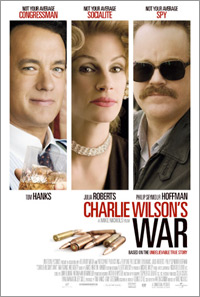 Coinciding with the visit of a dear friend who's spent the past few years working in Afghanistan for both development NGOs and (non-U.S.) government agencies, the DVD of Charlie Wilson's War recently arrived from Netflix. My friend recommends it. Also, I [heart] Philip Seymour Hoffman. And I can tolerate Tom Hanks in appropriate doses. But an op-ed by the real-life Charlie Wilson in yesterday's Washington Post makes me even more eager to watch it soon. He writes:
Coinciding with the visit of a dear friend who's spent the past few years working in Afghanistan for both development NGOs and (non-U.S.) government agencies, the DVD of Charlie Wilson's War recently arrived from Netflix. My friend recommends it. Also, I [heart] Philip Seymour Hoffman. And I can tolerate Tom Hanks in appropriate doses. But an op-ed by the real-life Charlie Wilson in yesterday's Washington Post makes me even more eager to watch it soon. He writes:
In a scene near the end of the movie "Charlie Wilson's War," after the mujaheddin victory over the invading Soviet military, congressional appropriators turn down my request for funds to rebuild Afghanistan's schools, roads and economy. If we had done the right thing in Afghanistan then -- following up our military support with the necessary investments in diplomacy and development assistance -- we would have better secured our own country's future, as well as peace and stability in the region. ...
[I]nstead of intensifying our diplomatic and humanitarian efforts to help the Afghans meet their postwar challenges, we simply walked away -- leaving a destroyed country that lacked roads, schools, and any plan or hope for rebuilding. Into this void marched the Taliban and Al-Qaeda, and we all know what happened after that.
Whenever I'm reminded of our support for the likes of the mujahadeen, Saddam Hussein's war against Iran, and Manuel Noriega in Panama, I can't help but wonder -- what future enemy are we currently arming and training? Where are we currently focusing on military aid when a more comprehensive approach is needed to create real security? (Pakistan, I'm looking in your direction ...)
Wilson issues this warning:
We simply cannot make the same mistake. The lesson here is about more than the good manners of reciprocating a favor. It takes much more to make America safe than winning on the battlefield. Had we remained engaged in Afghanistan, investing in education, health and economic development, the world would be a very different place today. The aftermath of a congressional committee's decision so long ago has turned out to be a warning that America is not immune to the problems of the very poorest countries. In today's world, any person's well-being -- whether he or she is in Kandahar, Kigali or Kansas -- is connected to the well-being of others.
And he offers this simple advice, to which the military-industrial complex is so well innoculated:
We can avoid the need to spend so much on our military -- and put so many of our soldiers in harm's way -- simply by investing more in saving lives, creating stable societies and building economic opportunity.
Ryan Rodrick Beiler is the Web editor for Sojourners.
Got something to say about what you're reading? We value your feedback!